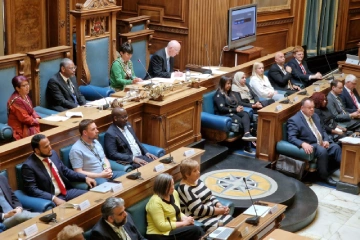 Yesterday, members of Nottingham City Council’s Health and Wellbeing Board supported a five-year strategy designed to prevent gambling-related harms among people residing in Nottingham City. As part of the strategy, the existing gambling licensing policy will be reviewed and amended to ensure that operators take problem gambling seriously and offer various preventive measures. The advertising and sponsorship policy is also to be updated by councilors.
Yesterday, members of Nottingham City Council’s Health and Wellbeing Board supported a five-year strategy designed to prevent gambling-related harms among people residing in Nottingham City. As part of the strategy, the existing gambling licensing policy will be reviewed and amended to ensure that operators take problem gambling seriously and offer various preventive measures. The advertising and sponsorship policy is also to be updated by councilors.
The five-year strategy aims to introduce reforms to the existing gambling regulations, raise awareness among people about the possible dangers of gambling, and support people with gambling problems. Adele Williams, Nottingham City Council’s Health and Wellbeing Board’s chairperson, explained that the strategy’s goal was to detect people susceptible to gambling problems and help them before it is too late. She added that the city’s poorer areas have the highest number of gambling venues. Ms. Williams also noted that even Gamble Aware, an organization dedicated to helping people with gambling problems, was funded by the industry.
Ms. Williams asked city staff why all efforts had been geared toward supporting people with gambling problems instead of helping them before their reach crisis point. Specialty Registrar in Public Health, Mike Saunders, said that the strategy was based on the results from a “Health Needs Assessment” survey. He also noted that the public stigma of gambling disorder resulted in many people feeling ashamed of their problem. Hence, they prefer to keep it secret instead of looking for help.
The Strategy Takes into Account Various Risk Factors for Developing Gambling Problems
Mr. Saunders confirmed Williams’ words that the density of gambling facilities tends to be the highest in the most deprived areas. He said that people living in poorer neighborhoods are most prone to gambling. Saunders also noted that the strategy took into account socioeconomic factors, too. He expressed hope that Nottingham City would protect its people from problem gambling and support those struggling with gambling disorders.
Councilor Cheryl Barnard embraced the new strategy, explaining that it would be most helpful for the people living in the city’s most deprived neighborhoods. She noted that there were four or five gambling venues in Bulwell, and a new one will open soon. Ms. Bernard added that the gambling industry usually targets people who believe gambling is their one-way ticket out of poverty.
National survey data show that approximately 4,500 people aged 16 and above and 1,000 students between 11 and 16 years of age show signs of gambling problems in Nottingham City alone. Besides, problem gambling support services are somehow ignored by many residents of Nottingham City. According to a recent health needs assessment study, only 48 people have sought help through the city’s helpline, while the number of people affected by gambling problems is much higher.